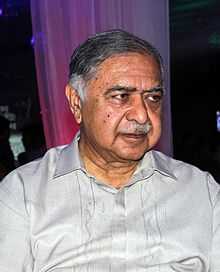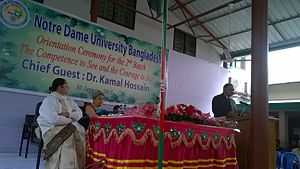Kamal Hossain
| Kamal Hossain কামাল হোসেন | |
|---|---|
 | |
| Minister of Law | |
| In office 12 January 1972 – March 1973 | |
| Foreign Minister of Bangladesh | |
| In office March 1973 – August 1975 | |
| President | Mohammad Mohammadullah Sheikh Mujibur Rahman |
| Prime Minister | Sheikh Mujibur Rahman Muhammad Mansur Ali |
| Preceded by | Abdus Samad Azad |
| Succeeded by | Abu Sayeed Chowdhury |
| Personal details | |
| Born | April 20, 1937 |
| Nationality | Bangladeshi |
| Political party | Gano Forum Bangladesh Awami League (before 1990) |
| Spouse(s) | Hameeda Hossain |
| Residence | Dhaka |
| Alma mater | University of Oxford |
| Occupation | Politician, statesman and lawyer |
| Known for | A principal author of the Constitution of Bangladesh |
Kamal Hossain (Bengali: কামাল হোসেন, born 20 April 1937) is a Bangladeshi jurist, statesman, politician and freedom fighter.[1] After the independence of Bangladesh, he served as Minister of Law from 1972 to 1973 and as Minister of Foreign Affairs from 1973 to 1975.
Personal
Hossain is the father of lawyer Sara Hossain and the father-in-law to her husband David Bergman, a British journalist based in Dhaka.[2]
Education
He was awarded a Bachelor of Jurisprudence degree with honours from the University of Oxford in 1957 and a Bachelor of Civil Law from the same institution in 1958. In 1964 he was awarded a Doctorate in International Law. He was called to the bar by Lincoln's Inn, London.
Political career
Hossain accompanied Sheikh Mujibur Rahman in negotiations with Pakistani President General Yahya Khan and Pakistan Peoples Party Chairman Zulfikar Ali Bhutto on the transfer of power to the National Assembly following the 1970 election.
Hossain was arrested during the Bangladesh Liberation War in April 1971 by the Pakistani government and kept in custody along with Sheikh Mujib in West Pakistan. He was released together with Mujib when both of them flew to London and then to independent Bangladesh.
After the independence of Bangladesh, Hossain served as the Minister of Law (1972–1973), Minister of Foreign Affairs (1973–1975) and Minister of Petroleum and Minerals (1974–1975). One of his earliest tasks as Minister of Law was the drafting of the Constitution of Bangladesh which was completed in 1972. Hossain is regarded as the father of the Bangladeshi constitution.
He was a member of the Awami League until the early 1990s, when he formed his own political party, Gano Forum (People's Forum),[3] following disputes with Awami League leader Sheikh Hasina.
Legal career

He is a leading jurist in Bangladesh and has conducted a number of landmark cases, published in various law journals in Bangladesh. In addition he has appeared in several international arbitrations, both as a lawyer and an arbitrator, including acting as an arbitrator in the Iran-United States Claims Tribunal.
Role in the international arena
Hossain is renowned worldwide as a jurist and enjoys a long-standing association with the United Nations. Between 1998 and 2003, he served as the UN Special Rapporteur on Afghanistan. He is a current member of the UN Compensation Commission. He is also currently vice chairman of the International Law Association London, chairman of both the [4] BLAST and South Asian Institute of Advanced Legal and Human Rights Studies (SAILS), honorary fellow of Notre Dame University Bangladesh and the Institute of Mineral and Petroleum Law, University of Dundee and advisory council member for Transparency International. He has also acted as an observer in various elections around the world.
See also
References
- ↑ "Law and Democracy with Dr Kamal Hossain". University of Cambridge. 31 May 2006. Retrieved 1 November 2010.
- ↑ "Nurul Kabir to continue his defence on Dec 20". BDNews24. 2011-12-01. Retrieved 2013-02-17.
- ↑ "Two decades of Gono Forum". Probenews. 2012-02-04. Retrieved 2012-12-22.
- ↑ Bangladesh Legal Aid and Services Trust
External links
Lectures
- International Law and the Challenge of Change in the Lecture Series of the United Nations Audiovisual Library of International Law
- International Law and Sustainable Development in the Lecture Series of the United Nations Audiovisual Library of International Law
| Political offices | ||
|---|---|---|
| Preceded by Abdus Samad Azad |
Minister of Foreign Affairs 1973-1975 |
Succeeded by Abu Sayeed Chowdhury |